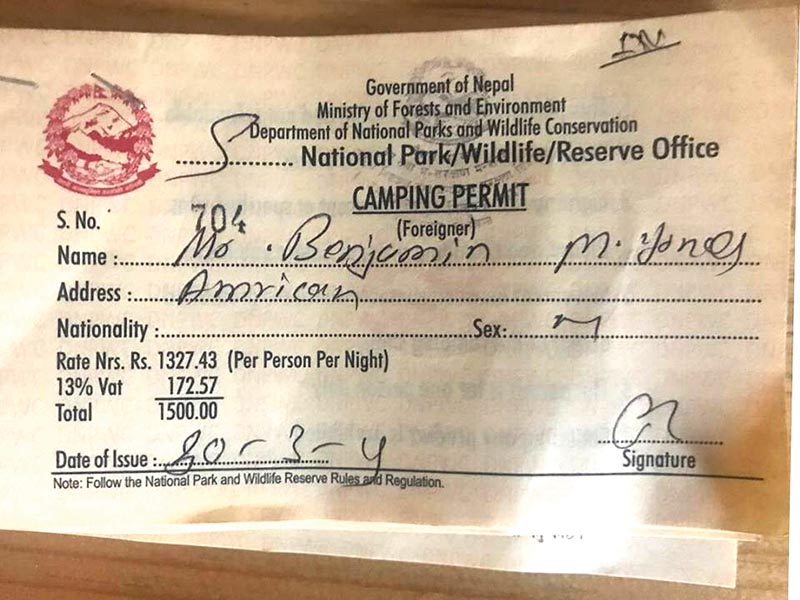Extra fee in Everest region worries entrepreneurs
Kathmandu, March 30
The Department of Tourism (DoT) has started issuing expedition permits for several peaks across the country for this spring season. Among the 414 peaks that the government has opened for climbing, Mount Everest (8848m) is the peak which most mountaineers take permits to summit. Around six teams with 52 members have received expedition permits for Mt Everest from the DoT till Friday for this spring season.
The DoT levies $11,000 per person for foreign climbers for expeditions to Mt Everest during the spring season, while Nepali climbers have to pay Rs 75,000 per person. However, starting from this season Sagarmatha National Park (SNP) has started levying extra fee on both foreigners and Nepalis without issuing any notice. The SNP levies Rs 1,500 on foreign climbers, Rs 1,500 for Nepalis and Rs 100 for Sherpas.
Meanwhile, the entrepreneurs involved in the expedition business have condemned the national park’s decision of collecting entrance fee randomly. As per the entrepreneurs, the climbers are already paying expedition royalty to the central government. They have questioned the rationality behind paying additional fees per head to enter the national park as the collected amount will again go to the central government’s account.
“This is just another way of collecting money. Our government seems more money-oriented than service-oriented and this step taken by the SNP will negatively affect the sector,” said Santabir Lama, president of Nepal Mountaineering Association (NMA). According to him, the association had received information regarding the additional fees at the SNP four days ago.
“After getting several complaints from stakeholders we spoke to SNP officials and were informed that the additional fee was being levied as per a decision of the government itself,” Lama said, “So they have just implemented the decision from this season.”
NMA President Lama also said that the government should think about it and take back the decision. Levying additional fees on foreigners may make sense for economic policy of the country but collecting fees under several titles from Nepalis does not make any sense at all, he said, adding, “Bothersome taxes on the adventure sector may discourage high-altitude workers.”
According to Pramod Bhattarai, chief warden of SNP, the new rule was published in Nepal Gazette that was issued on October 15, 2018. “We are just implementing the rule mentioned in the Gazette and are not collecting fees as per our will,” he stated.
Meanwhile, Damber Parajuli, president of Expedition Operators Association - Nepal, said that levying the additional tax was a wrong decision. “We have been holding talks with the government on a regular basis on the need to start a one-window system to collect fees so that climbers do not have to go through hassles but the government seems to have turned a deaf ear to our suggestion.”
“Even if the government did want to levy the tax it should have first consulted us or at least informed us six months prior to taking the decision,” said Parajuli, adding that this has discouraged both climbers and high-altitude workers. He further said this action will surely have a negative impact on Visit Nepal 2020 campaign.
Similarly, Lakpa Rita Sherpa, a renowned climber and who is currently in the Everest region updated his status on Facebook today, writing ‘Everest climbers pay $11,000 per person as climbing permit that allows them to climb the mountain and stay at the base camp. But from this season SNP has started collecting Rs 1,500 per climber and Rs 100 from Sherpas as camping charge while Rs 1,500 from guides to enter the national park. In my opinion this is not fair so I would like to request NMA, Trekking Agencies’ Association of Nepal, expedition operators and tourism ministry to cooperate on this issue’.






